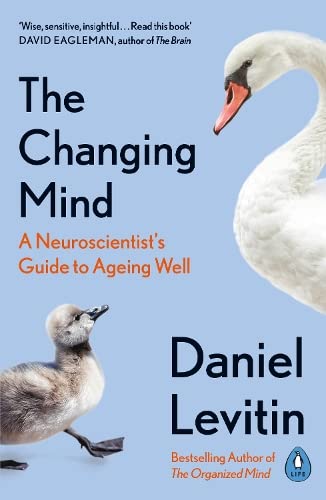
The Changing Mind: A Neuroscientist's Guide to Ageing Well
Daniel J. Levitin
About the Author

Daniel J. Levitin
Questions & Answers
The brain evolves and adapts throughout the aging process through neuroplasticity, the brain's ability to reorganize itself by forming new neural connections. This process is influenced by genetics, experiences, and lifestyle choices. As we age, the brain becomes more efficient, particularly in abstract thinking and wisdom, as older adults accumulate more experiences and knowledge. However, sensory systems may decline, and memory can become less reliable, especially for recent events.
The implications for cognitive health and well-being are significant. Engaging in activities that challenge the brain, such as learning new skills, social interactions, and exercise, can help maintain cognitive function and protect against dementia. A healthy lifestyle, including a balanced diet, regular physical activity, and adequate sleep, is crucial for brain health. By understanding the brain's adaptability, we can take proactive steps to enhance cognitive health and well-being as we age.
Successful aging is influenced by a combination of genetic, environmental, and lifestyle factors. Key contributors include:
- Personality Traits: Traits like conscientiousness, agreeableness, and emotional stability are linked to positive outcomes in aging.
- Cognitive Reserve: High levels of education and complex occupational roles can build cognitive reserve, protecting against age-related cognitive decline.
- Physical Activity: Regular exercise improves physical and mental health, delaying the onset of age-related diseases.
- Social Engagement: Maintaining social connections and engaging in meaningful activities can enhance mental health and well-being.
- Lifestyle Choices: Healthy eating, adequate sleep, and stress management contribute to successful aging.
To support wisdom and engagement in later years, individuals and society can:
- Encourage Lifelong Learning: Provide opportunities for continued education and skill development.
- Promote Social Interaction: Facilitate intergenerational interactions and community involvement.
- Support Physical Health: Ensure access to healthcare and promote healthy lifestyles.
- Foster a Respectful Society: Value the contributions of older adults and combat ageism.
- Create Inclusive Workplaces: Allow flexible work arrangements and accommodations for older workers.
To harness the brain's potential for improved memory, intelligence, and creativity as we age, focus on:
-
Lifestyle: Engage in regular physical activity, which enhances blood flow and brain health. Exercise, even in small amounts, can improve memory and cognitive function.
-
Cognitive Stimulation: Engage in activities that challenge the brain, like puzzles, games, or learning new skills. This stimulates neuroplasticity, the brain's ability to form new connections.
-
Social Interaction: Maintain social connections, which can improve emotional well-being and cognitive function. Programs like intergenerational housing can foster social engagement.
-
Healthy Diet: Consume a balanced diet rich in omega-3 fatty acids, antioxidants, and vitamins. This supports brain health and cognitive function.
-
Sleep: Ensure adequate sleep, as it aids memory consolidation and cognitive function.
-
Continuous Learning: Keep learning new things, which can enhance fluid intelligence and cognitive reserve.
-
Mindfulness and Stress Reduction: Practice mindfulness and stress-reduction techniques, which can improve emotional regulation and cognitive function.
By integrating these strategies, you can maintain and even enhance cognitive abilities as you age.
The scientific underpinnings of personality are rooted in the interplay of genetics, environment, and opportunity. Personality traits are influenced by our genetic makeup, shaped by our experiences and the social contexts we grow up in. The Big Five model, which categorizes personality into openness, conscientiousness, extraversion, agreeableness, and neuroticism, provides a framework for understanding these traits.
Using this knowledge, we can foster personal growth and well-being by:
- Understanding our traits: Recognizing our strengths and weaknesses can help us make informed decisions about our lifestyle and goals.
- Adapting to change: Knowing that personality can change throughout life allows us to actively work on improving traits like conscientiousness and openness.
- Creating a supportive environment: By understanding the impact of social interactions and relationships on personality, we can build a network that supports our growth.
- Promoting self-regulation: Developing self-awareness and self-regulation skills can help us manage impulsive behaviors and maintain a healthy lifestyle.
- Encouraging lifelong learning: Cultivating curiosity and openness to new experiences can enhance cognitive function and emotional well-being.
By leveraging the insights from personality science, individuals can make positive changes that contribute to their overall well-being and personal development.
To create a society that values and leverages the wisdom of older adults, we must foster environments that promote healthy aging and cognitive health. This involves:
-
Education and Awareness: Educate society about the positive aspects of aging, emphasizing the value of experience and wisdom. Encourage intergenerational programs that facilitate knowledge exchange.
-
Workforce Inclusion: Allow older adults to remain in the workforce through flexible schedules, accommodations, and anti-discrimination laws. Encourage companies to benefit from the experience and skills of older workers.
-
Healthcare Focus: Prioritize research and treatment for age-related diseases, including cognitive decline, and promote healthy lifestyle choices to enhance cognitive health.
-
Social Engagement: Encourage social activities and community involvement to combat loneliness and isolation, which can negatively impact mental health.
-
Cognitive Stimulation: Provide opportunities for lifelong learning and cognitive challenges, such as puzzles, reading, and new experiences, to maintain brain health.
-
Supportive Infrastructure: Develop assisted living facilities and home care services that cater to the needs of older adults, ensuring they can live independently with dignity.
-
Policy Changes: Implement policies that support healthy aging, such as universal healthcare, retirement benefits, and social security systems that recognize the contributions of older adults.
By implementing these strategies, we can create a society that not only values the wisdom of older adults but also promotes their well-being and allows them to contribute to society for as long as possible.